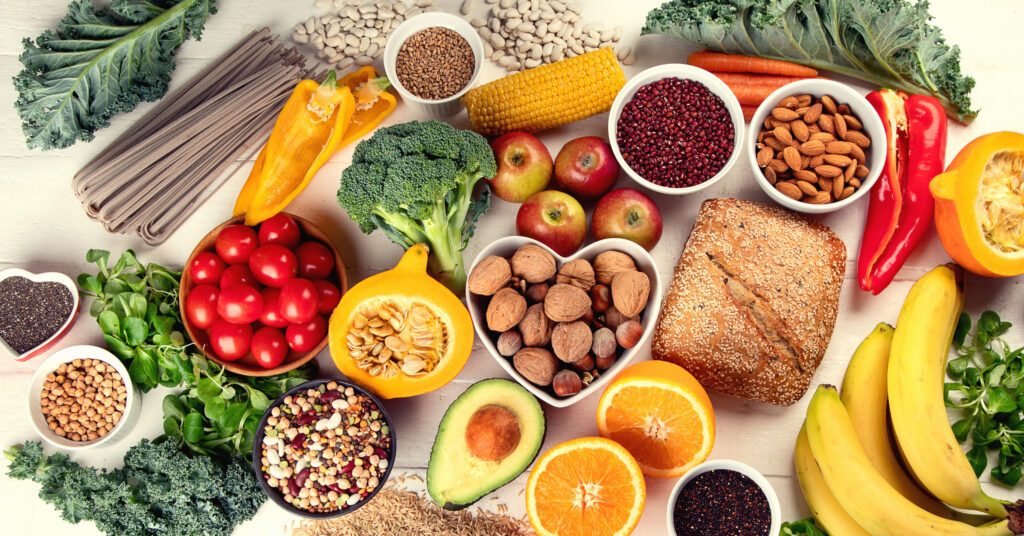New Research: Not All UPFs Created Equal, Plant-Based Meat Can Be Part of Healthy Diet
8 Mins Read
Two new European health studies suggest that while a plant-rich, minimally-processed whole foods diet is ideal for good health, consuming some processed foods including bread and plant-based meat is perfectly fine.
Another week, another study that underlines the importance of reducing processed meat consumption and highlights the benefits of a minimally-processed whole foods plant-based diet! With soaring lifestyle disease rates (including diabetes, obesity and heart disease) across the world, what to eat for better health continues to dominate mainstream media headlines.
Just this month, the World Health Organization released a Diet Impact Assessment Tool for Europe to help build data-driven sustainable and health-centric diet policies. It provides a framework for governments to make their populations’ diets more planet-friendly, healthy and affordable, align diets with global health and climate targets, and implement policy changes to help the economic, environmental and nutritional challenges that come from today’s food system.
A study by The Lancet in 2019 revealed that improving diets could prevent one in five deaths globally. In today’s population figures, that’s 1.6 billion people – this means the number of lives that could potentially be saved is higher than the entire populations of India, China or the continent of Africa, or double the population of the US and the EU, combined.
Whole-foods plant-based is the way to go

Published in BMC Medicine, a review of 37 health studies by researchers in Germany has revealed that switching from processed animal products to whole-foods plant-based diets can significantly reduce the risk of cardiovascular disease, diabetes and death.
The analysis found that transitioning from red and processed meat, poultry, fish, eggs and dairy products to plant-based foods like whole grains, beans, nuts, whole grains, olive oil, and fruits and vegetables can starkly affect our health for the better – especially if the latter items are replacing red and processed meat.
For example, replacing 50g of processed meat (like sausages, hot dogs, salami, bacon, ham, chicken nuggets and meat-based sauces) with 28-50g of nuts daily can lower the risk of death by 21% from any cause – that’s one in five, ring a bell?
Meanwhile, the risk of cardiovascular disease – by far the leading cause of death globally (responsible for a third of all deaths) – can be reduced by 25% if 50g of processed meat is replaced by nuts or legumes per day. And swapping one egg with 25g of nuts is linked to a 17% lower risk. There was no clear evidence that subbing poultry or fish with nuts or legumes would decrease this risk.
The study found similar benefits for all causes of death analysed, including type 2 diabetes, which was found to have a 20% lower risk of developing if 50g of processed meat was replaced with up to 28g of nuts per day or an egg was substituted for 30g of whole grains or 10g of nuts daily.
It’s important to note that the research had certain limitations. There was no distinction between the different types of dairy, and there was some evidence that fermented dairy products like yoghurts and cheeses can be healthier. Additionally, the study didn’t look at the benefits of replacing red and processed meat with other animal-based foods like fish, poultry and eggs.
However, the most convincing finding was the effect of switching red and processed meat with plant-based foods, according to nutrition expert Prof Nita Forouhi, who was not involved with the study. She told the Guardian that while further research is key, in the meantime, “it would be prudent to particularly focus on reducing red and processed meat intake, for which the potential adverse health and environmental impacts are greatest”.
This latest study adds to the pile of research about healthy eating that can be summarised as follows: eat less meat, particularly the processed kind, and eat more unprocessed whole plants (think veggies, fruits, nuts and seeds). Governments are paying attention to these results too, with countries like Taiwan, Denmark and South Korea pledging to promote plant-rich diets as part of their national policy.
The researchers didn’t specifically highlight the reason why red and processed meats are bad for you in their report, but these foods are high in saturated fats – which are linked to cardiovascular disease, type 2 diabetes and cancer – as well as high in salt, nitrates and nitrites. In fact, the World Health Organization lists processed meat as carcinogenic. A study by the Harvard TH Chan School of Public Health of 216,695 Americans found that people eating the most red meat have a 62% higher risk of developing type 2 diabetes than those who consume it the least – and this risk increases with greater consumption.
Plant-based whole foods, on the other hand, have a high amount of essential nutrients such as fibre, antioxidants, monounsaturated fats (dubbed ‘good fats’) and micronutrients. And research has proven directly linked health benefits too: a 117,809-person study published in the American Journal of Kidney Diseases found that increased plant protein intake could reduce the risk of chronic kidney disease. Meanwhile, the Harvard study echoed the BMC Medicine research, noting that substituting a serving of red meat or dairy with a serving of nuts and legumes can lower the risk of type 2 diabetes by 30% and 22%, respectively.
But wait… not all UPFs are created equal!

The above results may come as a surprise when you view them alongside the findings of another recent study that digs deeper into the subject of UPFs, aka ultra-processed foods. This food category, originally based on research done by a Brazilian researcher called Dr Carlos Monteiro, who devised the NOVA classification system to measure the amount of processing in the foods we eat, has increasingly been in the spotlight ever since British infectious diseases physician Dr Chris van Tulleken‘s book, Ultra-Processed People: The Science Behind Food That Isn’t Food, came out in April.
These foods – which are produced via industrial formulations and techniques like extrusion or pre-frying, combined with cosmetic additives and substances of little culinary use, like high-fructose corn syrup, hydrogenated oils or modified starch, according to the NOVA classification – have been found to raise the risk of heart disease, stroke, obesity, breast and colorectal cancer, and hypertension. UPFs make up 57% of British diets and 60% of American calorie consumption.
However, some have pushed back against the overwhelmingly negative perception of UPFs, arguing that these foods are necessary to feed the world and that the lack of an agreed definition spurs confusion about what is a UPF, and what’s not. Others have noted that the NOVA system is based on the degree of processing of a certain food but does not speak to nutrition. A new study published in The Lancet adds additional nuance, suggesting that some UPFs can be good for you. The researchers based their findings on the dietary history of, and diseases of 266,666 people in seven European countries, including the UK.
While regular consumption of products like meat and sugary drinks is more likely to cause ailments like cancer, heart disease and Type 2 diabetes (sauces, spreads and condiments are also bad for you, but to a lesser extent), the researchers found that breads and cereals can actually lower the risks of developing these conditions, thanks to their fibre content.
Several more foods that were previously thought of as harmful to our health – sweets, desserts, ready meals, savoury snacks and plant-based meat – were included in the latter category too, with authors saying these are “not associated with risk of multimorbidity” (the medical term for when someone has two life-threatening diseases at the same time).
Like many processed foods, vegan meat alternatives have faced scrutiny for their ingredient lists. However, unlike most UPFs, plant-based meats typically contain a high amount of dietary fibre, are free of cholesterol, and are low in saturated fat, sugar and calories. Indeed more and more plant-based companies are highlighting these health benefits in consumer campaigns. For example, both Impossible Foods and Beyond Meat now have products that are endorsed by the American Heart Association.

The WHO-backed study did find that UPFs are more detrimental to human health, “we found that higher consumption of UPFs was associated with a higher risk of multimorbidity of cancer and cardiometabolic diseases,” said the authors. “These observations do suggest a role for some UPF in the onset of multiple chronic diseases. But they also show that the common assumption that all UPF foods are linked to adverse health events is probably wrong,” nutrition researcher Dr Ian Johnson, who was not involved in the study, told the Guardian.
Reflecting on the UPFs vs whole foods debate, co-author Heinz Freisling, added: “Our study emphasises that it is not necessary to completely avoid ultra-processed foods; rather, their consumption should be limited, and preference be given to fresh or minimally processed foods.”
Dr Duane Mellor, a senior lecturer at Aston University’s medical school, agreed. “The concept of ultra-processed foods is too broad,” he said.
In a LinkedIn post, Dr Martin Smollich, head of pharmaconutrition at Germany’s Institute of Nutritional Medicine, concurred with this thinking: “Ultra-processed foods are not all the same: there are UPFs with a very good and with a very poor nutritional profile – just as is the case with less processed foods.”
He added that the two food groups with major health risks are meat and soft drinks, highlighting British and Dutch studies echoing the same. “Especially for highly processed meat alternatives, there is no negative correlation,” he said. “Therefore, the accusation that plant-based meat alternatives are ‘unhealthy’ simply because they are highly processed is also incorrect.”
The Lancet study’s lead author Reynalda Cordova said the research proved that consumers need to have easy access to fresh and lesser-processed foods. The authors suggested that to prevent the risk of these diseases, they should substitute some – not all – UPFs in their diets with “similar but less processed foods”, or follow the Mediterranean diet, which is similar to the conclusion reached by the aforementioned BMC Medicine study.
Both studies are clear: consumers should aim for a mostly unprocessed, plant-based diet most of the time and supplement this occasionally with a few weekly servings of fibre-rich processed foods, including plant-based meat substitutes.




